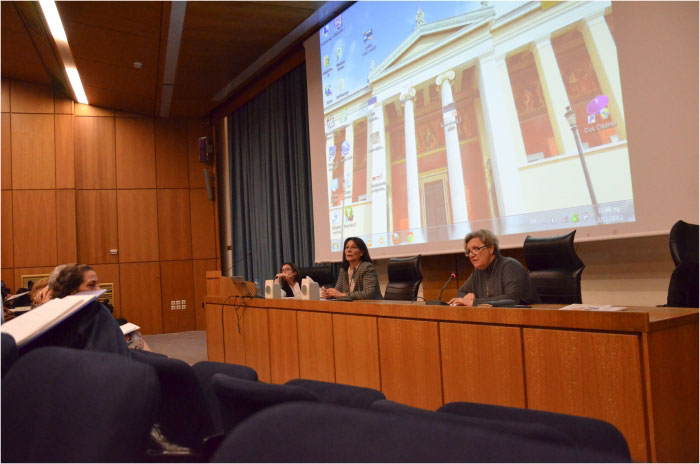Within the framework of the “Language Rich Europe” (LRE) project, the Research Centre for Language Teaching, Testing and Assessment (RCeL) of the University of Athens, in collaboration with the Centre for the Greek Language, organized, on November 3, a Workshop in order to present the Survey Lang’s interim report’s findings for Greece and discuss the national foreign language education policy framework.
Attendance to the workshop was limited to 50 people (by invitation). The workshop, entitled “Language Education Policy in Greece: Research and Implications”, aimed at contributing to the process of decision-making for the promotion of multilingualism at national level.
Dimitris Spyropoulos
SurveyLang
SurveyLang is an international consortium made up of eight organisations, each one a leader in its own area of expertise. SurveyLang exists to deliver the European Survey on Language Competences.
SurveyLang brings together knowledge and experience in the fields of language assessment, test development, translation processes, sampling and data collection, as well as in educational measurement, research design, psychometrics, and data analysis.
About the survey
The survey tested the two most widely taught European languages (from English, French, German, Italian and Spanish) in each country from a representative sample of pupils in their final year of lower secondary education.
The survey assessed students’ proficiency in listening, reading and writing. A sample of approximately 1,500 students per country was used.
Schools were sampled to ensure the test was representative of the student body in each country.
In addition, students were asked to fill in a questionnaire about their language learning and other background factors. This helped provide information on how demographic, social, economic and educational variables affect language proficiency across the member states.
Test results are related to the Common European Framework of Reference (CEFR). Establishing links to the CEFR has been a key focus of recent work and research for the language testing members of SurveyLang.
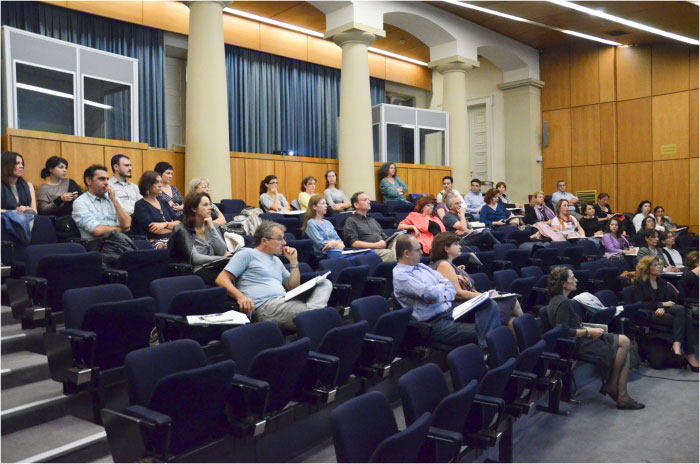 Interim Report Greece
Interim Report Greece
As Prof. Bessie Dendrinos states in the preface of the Interim Report, the economic crisis in Greece has brought about many changes in the public sector. State funded organizations have simply been dissolved or incorporated in other state, independent, private institutions or NGOs.
Moreover, despite some major changes that have recently been introduced in Greece aiming at providing more and better opportunities for foreign language learning within state schools, the current economic situation has crippled the majority of the reforms that were scheduled to take place.
On the basis of the sampling procedure designed by SurveyLang for all participating countries, the Greek student sample consisted of 112 schools and approximately 3200 students.
More than half of the students, and specifically 1,594, sat for the test in English in 57 schools. The rest sat for exams in French (55 of schools).
In a nutshell, nearly half of the Greek students tested performed as independent users in the first foreign language (B1 or B2 level), namely English, in all three testable skills.
That is, half the tested student population is able to communicate in a range of contexts and cope with problems of everyday life easily and with a degree of accuracy.
The rest of the students, minus 15% , are at basic user level (A1 or A2) in all three skills. The picture is quite different when it comes to the second foreign language. The percentage of students who are independent users of French is very low. The majority were diagnosed at pre-A1 level in all three skills.
First Language
Reading Proficiency
The percentage of students diagnosed to have B2 level proficiency in reading comprehension (30.2%) is slightly higher than those at any other level of proficiency.
If the percentage of B1 (14.9%) level students is added to the B2 level, we find that nearly half the student population in Greece is at “independent user” level (45.1%).
However, the high percentage of students who scored at A1 level (27.2%) or below (15.2) –i.e., a total of 42.4%– should ring a bell for those responsible for designing and implementing foreign language education policy in Greece but also in other countries, where students performed below their Greek peers.
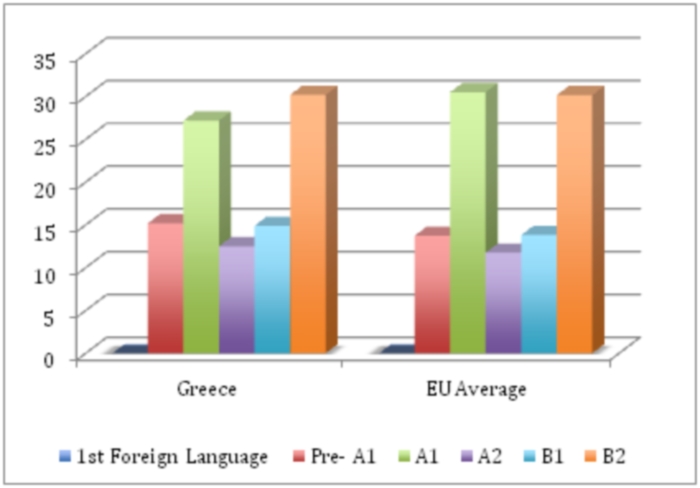
|
Percentage of students % at CEFR level
|
|||||
| 1st Foreign Language | Pre- A1 | A1 | A2 | B1 | B2 |
| England FR | 22.1 | 57.5 | 11.2 | 6.6 | 2.6 |
| France EN | 28.3 | 49.0 | 9.6 | 7.0 | 6.1 |
| Poland EN | 20.2 | 40.8 | 12.6 | 11.1 | 15.2 |
| Portugal ΕN | 20.2 | 40.8 | 12.6 | 11.1 | 15.2 |
| Belgium (Flemish) FR | 12.2 | 45.4 | 17.9 |
14.4
|
10.1 |
| Spain EN | 18.0 | 40.7 | 11.8 | 11.8 | 17.6 |
| Bulgaria EN | 23.1 | 32.2 | 11.1 | 10.2 | 23.4 |
| Belgium (French) EN | 9.7 | 42.0 | 17.1 | 16.5 | 14.6 |
| Croatia EN | 16.1 | 30.5 | 13.2 | 14.8 | 25.4 |
| Belgium (German) FR | 9.6 | 34.2 | 18.0 | 18.1 | 20.1 |
| Greece ΕΝ | 15.2 | 27.2 | 12.5 | 14.9 | 30.2 |
| Slovenia EN | 11.6 | 29.3 | 12.5 | 15.4 | 31.3 |
| Estonia EN | 7.1 | 23.5 | 9.1 | 13.5 | 46.8 |
| Netherlands EN | 3.7 | 20.8 | 15.3 | 22.5 | 37.7 |
| Malta EN | 3.9 | 10.2 | 7.1 | 15.7 | 63.1 |
| Sweden EN | 1.4 | 9.6 | 8.3 | 15.1 | 65.6 |
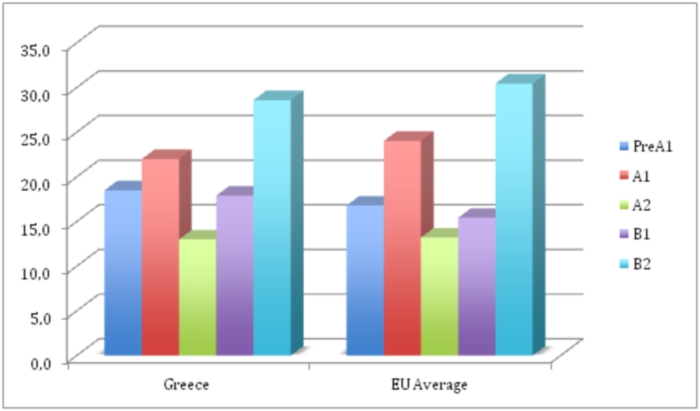
| Percentage of students % at CEFR level | |||||
| 1st Foreign Language | PreA1 | A1 | A2 | B1 | B2 |
| England FR | 30.5 | 46.6 | 15.2 | 6.7 | 1.0 |
| France EN | 40.6 | 33.5 | 12.3 | 8.0 | 5.6 |
| Spain EN | 31.9 | 31.5 | 12.6 | 11.9 | 12.0 |
| Belgium (Flemish) FR | 17.3 | 41.0 | 21.4 | 15.2 | 5.2 |
| Poland ΕΝ | 23.0 | 25.9 | 12.9 | 14.9 | 23.3 |
| Belgium (French) EN | 18.2 | 36.4 | 18.9 | 15.4 | 11.2 |
| Portugal EN | 23.0 | 25.9 | 12.9 | 14.9 | 23.3 |
| Bulgaria EN | 23.0 | 25.4 | 12.1 | 14.9 | 23.3 |
| Belgium (German) EN | 10.7 | 28.8 | 20.5 | 20.8 | 19.2 |
| Greece FR | 18.5 | 22.0 | 13.0 | 17.9 | 28.6 |
| Croatia ΕΝ | 11.5 | 17.9 | 14.3 | 21.7 | 34.6 |
| Estonia EN | 9.7 | 17.0 | 9.9 | 15.7 | 47.6 |
| Slovenia EN | 5.1 | 14.9 | 12.9 | 22.3 | 44.9 |
| Netherlands EN | 2.5 | 10.5 | 10.0 | 17.7 | 59.3 |
| Malta EN | 2.5 | 3.9 | 7.1 | 14.9 | 71.6 |
| Sweden EN | 0.7 | 3.3 | 5.5 | 13.9 | 76.6 |
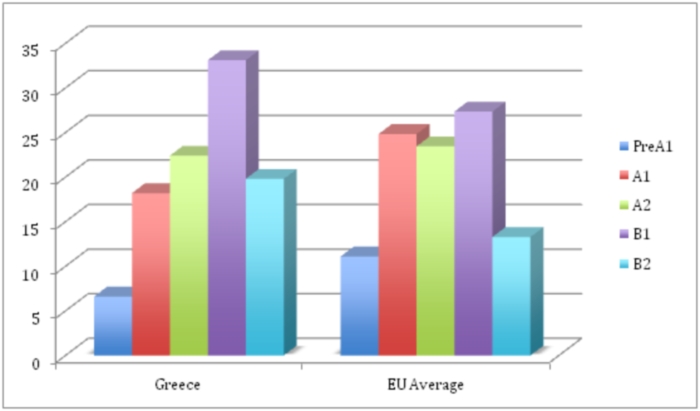
| Percentage of students % at CEFR level | |||||
| 1st Foreign Language | PreA1 | A1 | A2 | B1 | B2 |
| England FR |
35.9
|
40.2 | 13.4 | 7.6 | 2.8 |
| France EN | 23.7 | 37.6 | 23.2 | 12.9 | 2.7 |
| Belgium (Flemish) FR | 19.5 | 36.7 | 22.2 | 15.7 | 5.9 |
| Poland EN | 18.7 | 35.5 | 23.2 | 18.8 | 3.8 |
| Portugal ΕΝ | 18.0 | 32.7 | 22.7 | 21.2 | 5.4 |
| Spain EN | 15.4 | 32.6 | 25.1 | 18.9 | 8.1 |
| Bulgaria EN | 15.3 | 27.7 | 24.5 | 24.7 | 7.8 |
| Belgium (French) EN | 5.8 | 29.1 | 36.3 | 25.8 | 3.1 |
| Belgium (German) FR | 7.6 | 25.3 | 25.8 | 23.7 | 17.6 |
| Croatia EN | 5.5 | 21.8 | 27.7 | 34.9 | 10.1 |
| Slovenia ΕΝ | 1.1 | 20.7 | 30.2 | 37.5 | 10.4 |
| Greece EN | 6.6 | 18.2 | 22.4 | 33.1 | 19.8 |
| Estonia EN | 3.4 | 18.5 | 18.4 | 30.8 | 28.9 |
| Netherlands EN | 0.4 | 9.5 | 30.0 | 48.3 | 11.7 |
| Sweden EN | 0.2 | 5.8 | 18.6 | 47.6 | 27.9 |
| Malta EN | 0.5 | 5.4 | 11.4 | 36.2 | 46.5 |
Second Foreign Language
It is indeed alarming that a high percentage of students –i.e. 35.3%– have pre-A1 level reading proficiency, and only a total of 20.2% have reading proficiency in the second language -A2 level and above- and only 10.3% have autonomous user proficiency in reading in the second language.
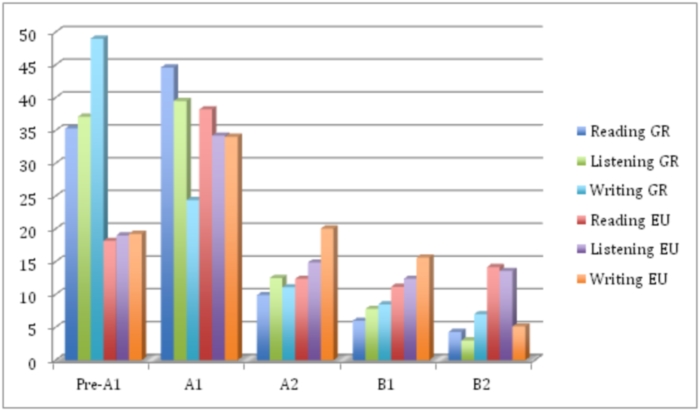
| Reading | Listening | Writing | ||||
| Greece | EU Average | Greece | EU Average | Greece | EU Average | |
| Pre-A1 | 35.3 | 18.18 | 37.1 | 19.0 | 49 | 19.3 |
| A1 | 44.6 | 38.22 | 39.5 | 34.2 | 24.4 | 34.0 |
| A2 | 9.9 | 12.38 | 12.5 | 14.9 | 11.1 | 20.1 |
| B1 | 6 | 11.17 | 7.8 | 12.4 | 8.5 | 15.6 |
| B2 | 4.3 | 14.17 | 3 | 13.6 | 7 | 5.1 |
• The Greek state offered teachers training opportunities for the development of ICT skills in the past and quite a lot of teachers have acquired basic certification in the use of new technologies. However, little training has been provided for the integration of ICT in teaching.
• Current trends in foreign language teaching put emphasis on communicative ability and multilingual comprehension and suggest a holistic approach to teaching.
• Teachers assign great importance to the skills of writing, speaking, listening and reading as well as to grammar, vocabulary, pronunciation. It appears that both teachers of English and teachers of French place little emphasis on culture and literature.
• Teachers of French receive more financial incentives for in-service training than their English language colleagues.
• Almost half of the teachers who participated in the research claim that they take part in in-service training voluntarily. A slightly higher percentage, though, reports that they are obligated to do so.
• French teachers seem to have participated in more in-service training than English teachers.
• The percentage of schools that have offered their teachers funding for exchange visits is low for both target languages. Nevertheless, French language schools seem to have offered such funding more frequently that English ones.
• Almost half of the teachers of English and a similar proportion of the teachers of French reported not having received training about the Common European Framework of Reference (CEFR). An analogous to that proportion claimed not using it at all or using it sometimes for organising their teaching.
